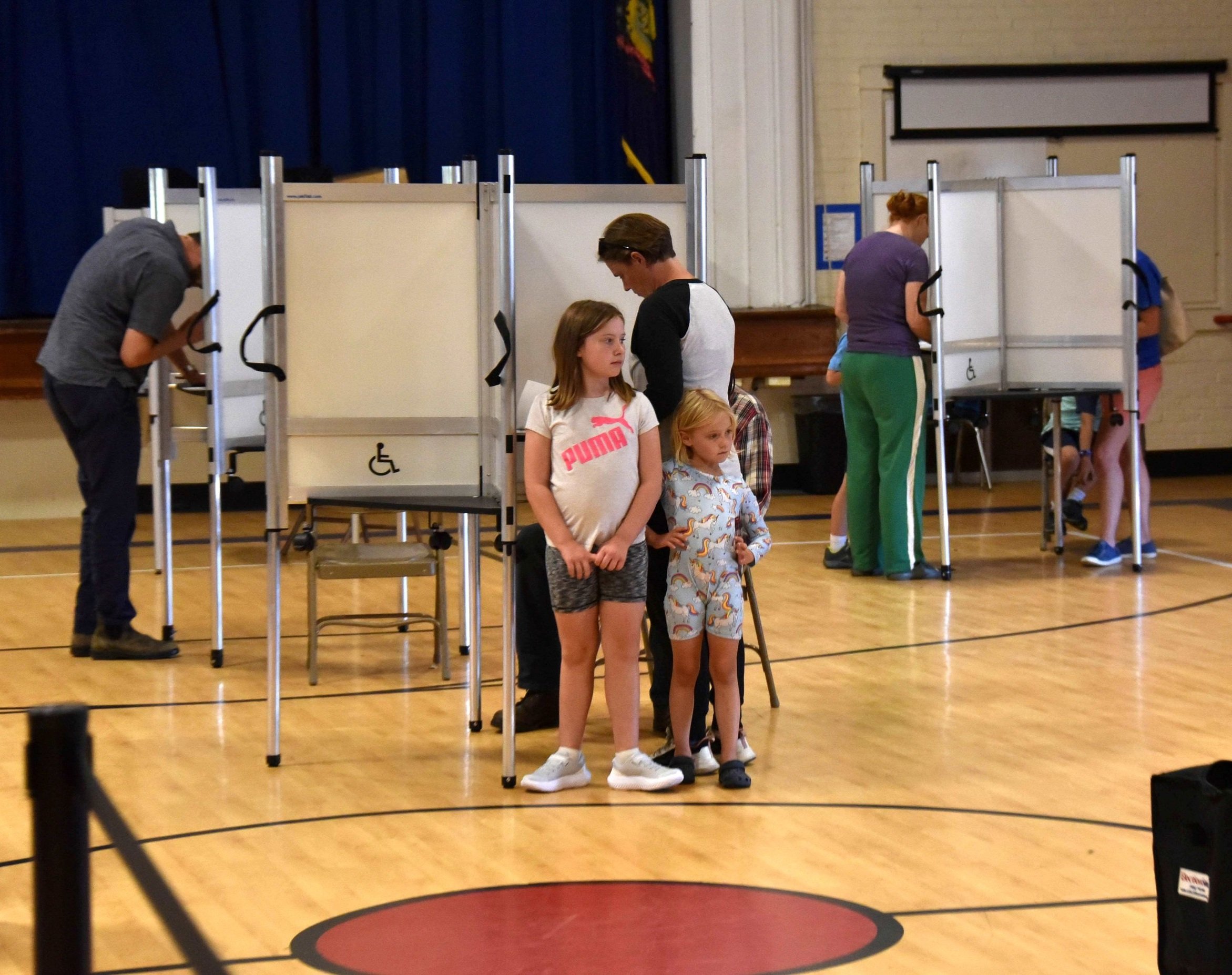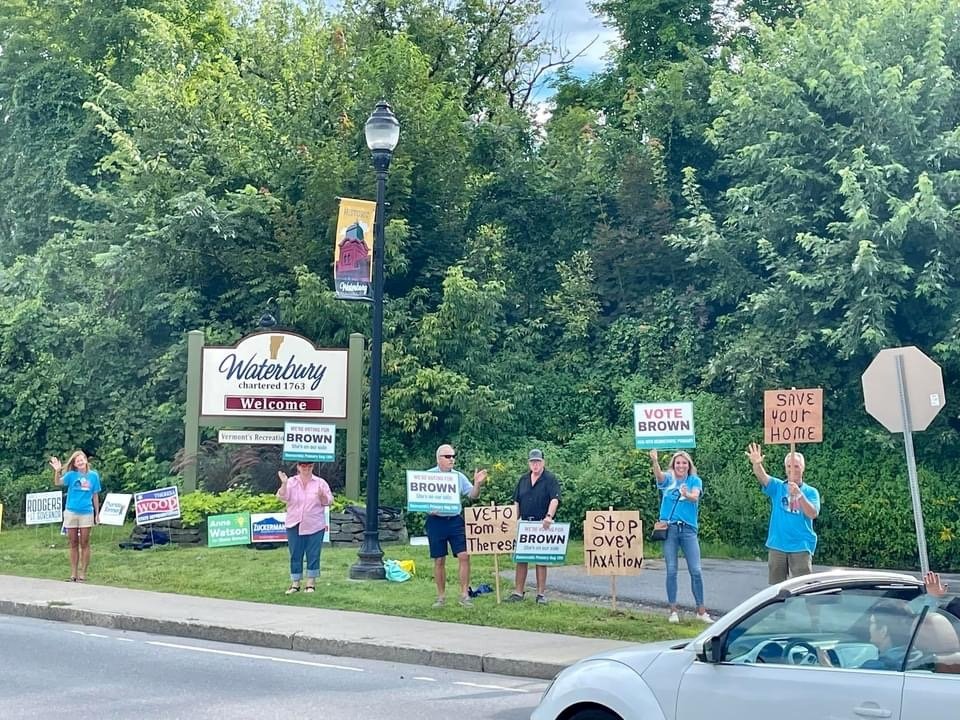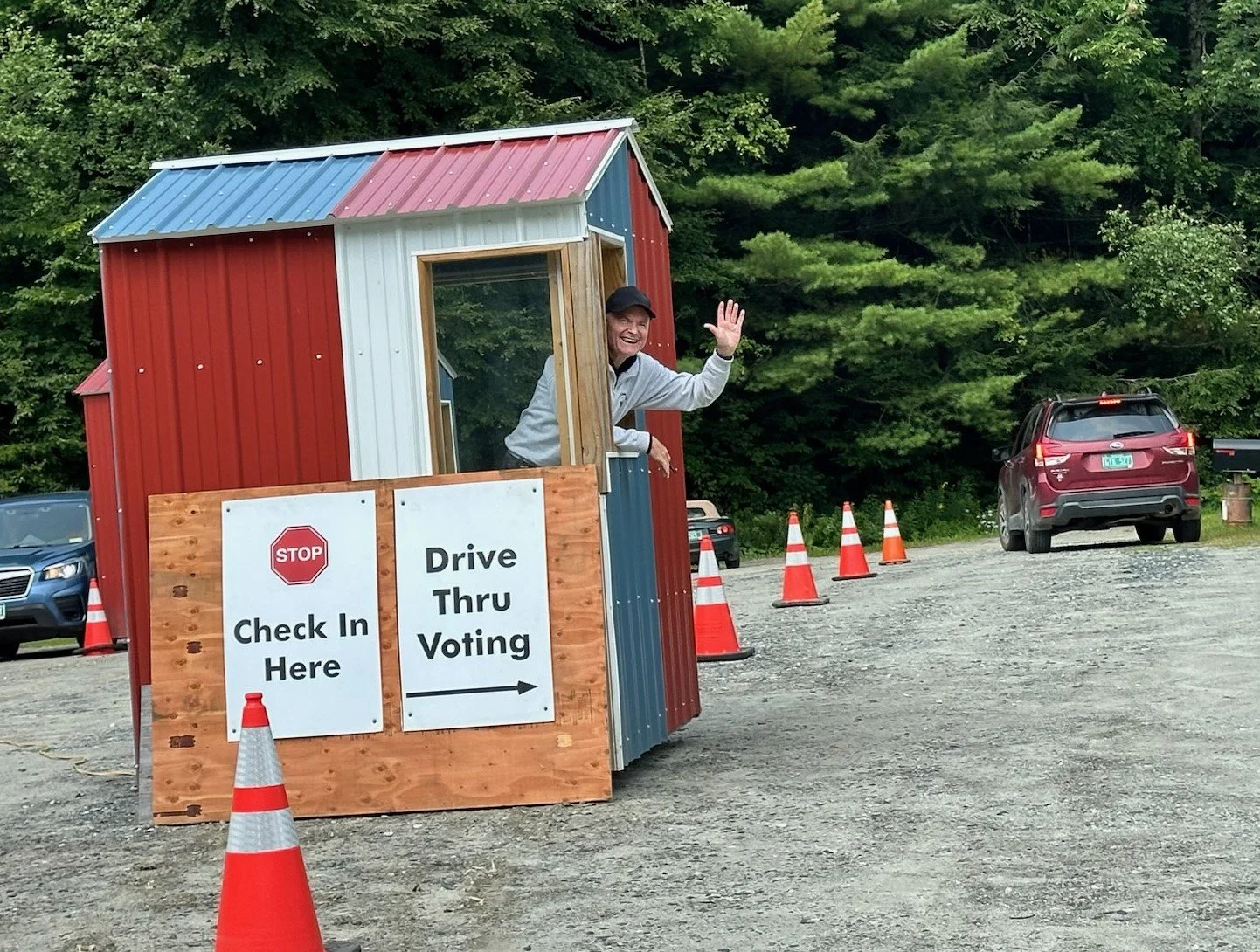Wood, Stevens survive primary challenge
August 14, 2024 | By Cheryl Casey and Lisa ScagliottiFaced with their first primary challenge in eight years serving together, Waterbury’s state representatives Theresa Wood and Tom Stevens prevailed against challenger Elizabeth Brown in Tuesday’s Democratic primary.
Waterbury voters cast ballots in the gym at Brookside Primary School on Tuesday. Photo by Gordon Miller
The Waterbury incumbents now move on to the Nov. 5 General Election in their bid to continue representing the Washington-Chittenden district in Montpelier that also covers Bolton, Huntington and Buel’s Gore.
In election results reported Tuesday night by each town clerk in the district, Wood garnered just over 33% with 1,108 votes. Stevens received 889 – just under 27% – and Brown, also a Waterbury resident, won 24% with 795 votes. The top two candidates move on to the November ballot.
Another Waterbury contender, Jonathan Griffin, was the only House candidate on the Republican primary ballot. With no major contests, the Republican ballot was less popular among voters who may choose any one of the three major party ballots in the primary election – Democratic, Progressive and Republican. Griffin won 188 votes in the district on Tuesday which amounted to 42%; blank ballots totaled 233 or 52% of the Republican ballots. Without a primary opponent, Griffin has yet to campaign actively.
Now running for a ninth two-year term, Stevens admitted that Tuesday was “a nervous day, but we worked hard this last month and I’m gratified I was able to garner enough votes to come in second and go on to the November election.”
Stevens spent the evening first helping to close down the polling setup at Waterbury’s Brookside Primary School along with his fellow Democratic candidates before heading home just a few blocks away to await the results in the company of friends and family.
“We were nervously waiting,” Stevens said, adding that it was a “relief to have the primary over.”
Reached Tuesday night after results were reported, Wood was busy wrapping up a successful primary day. “Other than getting the sheer number of votes, I really haven’t had a chance to process” the day’s victory, she said. Wood acknowledged her “respect that people had the choice, and they chose me. I’m grateful and I don’t take it for granted.”
After leaving the polls in Waterbury, Wood drove around the district collecting the 50 or so campaign signs staked in supporters’ yards. “No watch parties here,” Wood said, adding that she tries to declutter her constituents’ lawns “within 24 hours [of the vote] because I don’t want to abuse that privilege” of taking up the space. When reached for comment Tuesday evening, Wood had three signs left to retrieve.
Democratic legislative candidates outside Brookside Primary School in Waterbury on Tuesday afternoon chatted and greeted voters. Left to right: Reps. Theresa Wood and Tom Stevens, Sen. Ann Cummings and Elizabeth Brown. Photo by Lisa Scagliotti
A challenger shapes the race
First elected in 2008, Stevens has served for eight terms. Wood has served since 2015, first being appointed for a year and winning four terms since. The two have both appeared on local primary ballots unopposed since 2016.
This year was different with primary competition from Waterbury resident Elizabeth Brown, a new member on the Harwood school board having been appointed to a Waterbury seat on that board in April. A first-time candidate for office, Brown emerged from this spring’s public debate over school funding, property taxes and affordability with a strong message calling for reform and financial backing to introduce herself to local voters. Based on campaign finance reports filed with the Secretary of State’s office through Aug. 1, Brown’s campaign raised just over $22,000. By comparison, Wood and Stevens each raised just over $10,000.
Brown’s entry to the race captured public interest in the short campaign period from early June until this week. In July, she organized candidate forums in Waterbury and Huntington with the Waterbury event attracting over 100 people – some who shared their concerns with the candidates and many more just interested in the issues.
Although Stevens chairs the House General and Housing Committee and Wood chairs the House Human Services Committee, the issue they found voters raising in person and in public forums on social media most often was affordability with an emphasis on property taxes. In a special legislative session in June, Wood and Stevens voted to override vetoes by Republican Gov. Phil Scott of bills that impacted state spending, particularly education funding.
With a background in banking, finance and strategic planning, Brown’s campaign message of curbing state programs and reforming education funding resonated with voters who joined her to march in Waterbury’s Not Quite Independence Day parade and hosted dozens of her campaign lawn signs across the district and even in neighboring towns.
On Tuesday, Brown also got support from Gov. Scott himself as his campaign sent out a text message to his supporters saying: “It’s election day, and if you’re voting in the Dem. primary, I hope you’ll consider Elizabeth Brown for State Rep. We will not always agree, but Elizabeth will put her constituents ahead of politics.”
Brown shared the governor’s message on social media on Tuesday morning.
Scott’s Campaign Manager Jason Maulucci said Wednesday that Brown was one of three Democrats the governor backed in the primary. He also supported Democrat Stewart Ledbetter in the Chittenden Central Senate race and Randolph Democrat Jay Hooper in the Orange-Washington-Addison House district, Maulucci said. Ledbetter came in fourth in his race for three nominees for the General Election; Hooper’s race did not have a primary contest so he will advance to the November ballot.
Maulucci said the governor is willing to work with “any moderate, centrist candidate, from any party, if they are willing to put politics aside and work towards solutions, unlike the current Super Majority in Montpelier.” The governor and Democratic majority in the legislature have been at odds on multiple issues over the past two years, evident in steps lawmakers have taken to override vetos to legislation by the governor.
On social media and on his campaign website, Scott pledges to seek out and support moderate candidates for the legislature in the General Election. In a Facebook post Tuesday night, Scott said: “Now, we turn our focus to November. I am committed to working hard to help elect a more balanced, pragmatic, Legislature, and supporting candidate who will work with me, regardless of party, to make Vermont a more affordable place to live, work, raise a family, start a business, and retire in.”





Maulucci confirmed what that support will look like. “He will be supporting several more Democrats in the general, as well as independents,” he said.
Looking ahead to November, at least one additional candidate to Wood, Stevens and Griffin will be on the ballot in the Washington-Chittenden House race. Last week, Independent candidate James Haddad from Huntington filed with the Secretary of State. Independent candidates do not participate in a primary process and will be added to the Nov. 5 ballot.
And it’s still possible for an additional Republican candidate to join the race. According to the Secretary of State’s website, major parties may have committees nominate candidates for the General Election ballot “in the event their party does not nominate a candidate through the Primary.” The deadline for the parties to fill out their General Election rosters is 5 p.m. on Monday, Aug. 19.
Turnout typical & the rest of the ballot
In Tuesday’s primary Waterbury logged the highest turnout in the Washington-Chittenden legislative district. The 1,394 ballots cast represented 31% of the 4,467 registered voters, according to Town Clerk Karen Petrovic. Huntington had 21% turnout with 354 voters participating, Town Clerk Heidi Racht reported. That includes the eight voters from tiny Buel’s Gore, she noted. Bolton’s turnout of 143 voters was just 14% of its checklist, according to the town’s report to the Secretary of State.
Photo by Gordon Miller
Early voting in Waterbury was particularly strong, Petrovic said, with 649 ballots cast before Tuesday – more than 100 of those were voted on Monday.
Turnout in Waterbury was similar to primary elections in recent election years. The 2022 primary saw turnout of 30% and just under 36.7% participated in 2020.
In the past decade, the 2016 primary election had the highest turnout with 37.4% of the town’s 3,878 registered voters at the time. That year the governor’s office was wide open as former Gov. Peter Shumlin was not running for re-election and both Republican and Democratic parties had primary contests. Republican Phil Scott and Democrat Sue Minter emerged from that election to go on to the General Election with Scott winning his first term. Scott on Tuesday was unopposed in the GOP primary. He will be on the Nov. 5 ballot seeking his fifth term as governor. He will face Democrat Esther Charlestin of Middlebury who won the Tuesday Democratic primary with 49% of the vote over Peter Duval of Underhill who has run for office before as a Republican.
The lieutenant governor’s race was the only statewide office with primary contests on Tuesday. On the Democratic ballot, incumbent Lt. Gov. David Zuckerman, a Hinesburg vegetable farmer, defeated challenger Thomas Renner, a Winooski City Council member and deputy mayor. Zuckerman won 56% of the vote to Renner’s 37%, according to the Secretary of State’s unofficial results.
Seeking a fourth term, Zuckerman will be on the November ballot alongside John Rodgers, a former state legislator from Glover, who won the Republican primary, 56% to 35% over Gregory Thayer from Rutland City, according to the Secretary of State.
Elsewhere on the ballot, none of the other statewide incumbents faced primary challenges including U.S. Sen. Bernie Sanders, I-Vt., and U.S. Rep. Becca Balint, D-Vt.
Duxbury elections official Greg Trulson greets voters arriving to cast ballots in the drive-through polling spot outside the town office and highway garage on primary election day. Photo by Willie Docto
In the two-seat Washington-2 House district covering Duxbury, Moretown, Fayston, Waitsfield and Warren, incumbent Rep. Dara Torre, D-Moretown, was on the ballot with newcomer Candice White, a Waitsfield Democrat. They had no challenger. There was no Republican candidate running in the primary either.
Likewise, the Washington County state Senate race saw no primary competition. Incumbent Sens. Anne Cummings and Anne Watson of Montpelier and Andrew Perchlik of Marshfield are all seeking re-election. All three were on the Democratic ballot. Perchlik and Watson have run previously with the Progressive Party label as well. The Republican Party had a single candidate on the primary ballot, Donald Koch of Barre Town. According to unofficial results with the Secretary of State, no write-in candidate garnered more than nine votes.
Waterbury Roundabout so far has not yet connected with Elizabeth Brown for comment about the election. This post will be updated.
See full election results by town, race, party and legislative district on the Vermont Secretary of State’s website. For more statewide coverage of the Vermont Primary Election, see VTDigger.org, VermontPublic.org and the Thursday edition of the TimesArgus.com.







